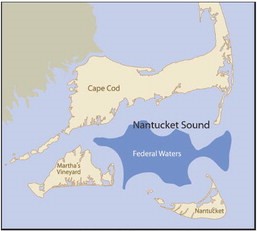Legislation sought to balance state and local control of Nantucket Sound
November 18, 2021
By John Stanton jstanton@inkym.com
The Alliance to Protect Nantucket Sound has been working quietly for a handful of years to help shape legislation it hopes will eventually bring some stability to the way Nantucket Sound is overseen by the state and federal governments.
The idea is to widen the constituency that such legislation would have, once it finds a sponsor and is officially filed in Congress. To do that requires a consistent outreach effort to myriad groups whose lives revolve around the sound.
“Overall, because of stakeholder outreach, this has become a bill that would really serve the Cape and Islands,” Audra Parker, President and CEO of the alliance, said.
“We are working with Senators Ed Markey and Elizabeth Warren, and Congressman William Keating’s office to get it filed.”
There is no definite date for that yet, although the bill has gone through an internal senate review. The growing constituency for the bill, she said, underscores its benefit to a list of different communities.
That constituency grew recently when the National Congress of American Indians (NCAI) a group that includes the Mashpee Wampanoag tribe and the Aquinnah Wampanoags of Gay Head, gave its official support.
The NCAI said in a resolution that, “This will secure traditional laws, cultures and the way of life for the native nations that continue to inhabit their ancestral homelands.”
In 2010, the National Park Service designated Nantucket Sound as the first oceanbased traditional cultural property, which means it is a historic and archaeological source of information relating to Native American exploration.
“Nantucket Sound has a unique geography in that the state controls the waters three miles out from the Sound shore and the federal government controls the big central area in the middle,” Parker said.
That donut shape of federal waters surrounded by state waters creates an imbalance between what is restricted by state law, but allowed under federal regulations. Parker points to the Ocean Sanctuaries Act, which under Massachusetts state law protects state waters from oil and gas exploration, sand and gravel mining, and offshore wind turbines. Those protections, she said, do not apply in the middle of the sound.
What any legislation that comes from the Alliance to Protect Nantucket Sound would do, according to Parker, is bring state control and federal control into some consistency. It would secure the sound as a spiritual site for the Wampanoag tribes on the Cape and the Vineyard. It would require the EPA to study environmental threats, such as ocean acidification and sea-level rise, and make recommendations.
“The idea is not to change who controls the middle of the sound,” Parker said. “It is to ensure consistency between the state and federal government that is not in the sound today.”

The Alliance to Protect Nantucket Sound has been working to shape legislation it hopes will bring consistency to federal and state control of the sound.
Courtesy of Alliance to Protect Nantucket Sound


